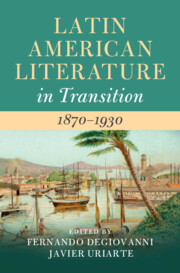Book contents
- Latin American Literature in Transition 1870–1930
- Latin American Literature in Transition
- Latin American Literature in Transition 1870–1930
- Copyright page
- Contents
- Figures
- Contributors
- Acknowledgments
- Introduction
- Part I Commodities
- Part II Networks
- Part III Uprisings
- Part IV Connectors
- Chapter 16 Money
- Chapter 17 Bodies
- Chapter 18 Travel
- Chapter 19 War
- Chapter 20 Science
- Chapter 21 Visual Technologies
- Part V Cities
- Index
- References
Chapter 18 - Travel
from Part IV - Connectors
Published online by Cambridge University Press: 14 January 2023
- Latin American Literature in Transition 1870–1930
- Latin American Literature in Transition
- Latin American Literature in Transition 1870–1930
- Copyright page
- Contents
- Figures
- Contributors
- Acknowledgments
- Introduction
- Part I Commodities
- Part II Networks
- Part III Uprisings
- Part IV Connectors
- Chapter 16 Money
- Chapter 17 Bodies
- Chapter 18 Travel
- Chapter 19 War
- Chapter 20 Science
- Chapter 21 Visual Technologies
- Part V Cities
- Index
- References
Summary
As a consequence of the process of modernization and the new growing engagement of Latin American countries in cultural and material global exchanges, the period 1870–1930 marked some important transitions in the way travel was understood. It became increasingly a bodily and material practice, and even a form of consumption. This chapter follows some of these trends in order to show how different Latin American intellectuals of the period reflected upon their own writing about travel. Discussing works by Lucio V. Mansilla, Miguel Triana, Enrique Gómez Carrillo, and Mário de Andrade, it focuses on descriptions of the modes and rhythms of travel. Finally, it pays attention to the means of transportation: traveling by horse, on foot, by boat, by train, or by car turns out to connote a different experience as the relationships that the traveler establishes with the landscape vary significantly depending on the type of transportation used.
Keywords
- Type
- Chapter
- Information
- Latin American Literature in Transition 1870–1930 , pp. 267 - 280Publisher: Cambridge University PressPrint publication year: 2022

